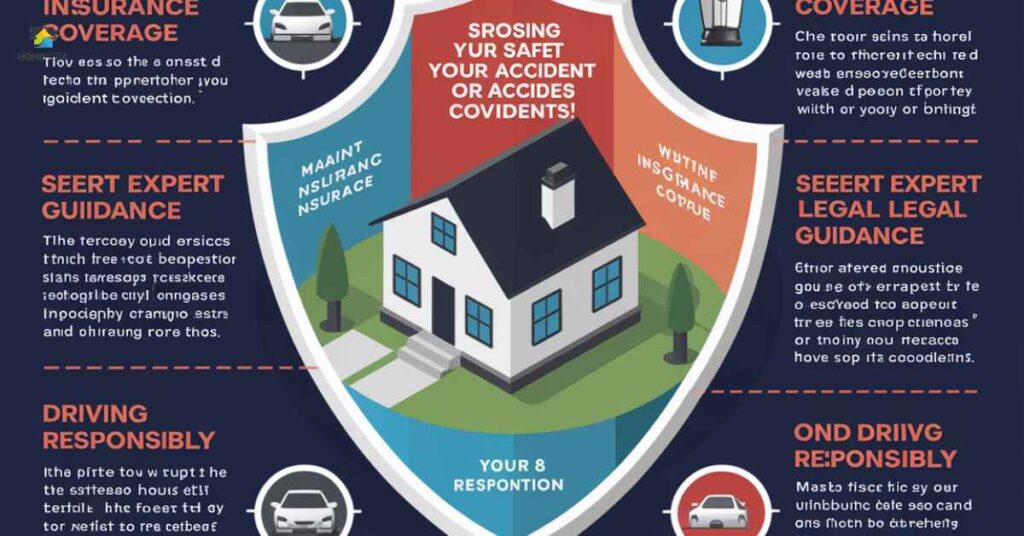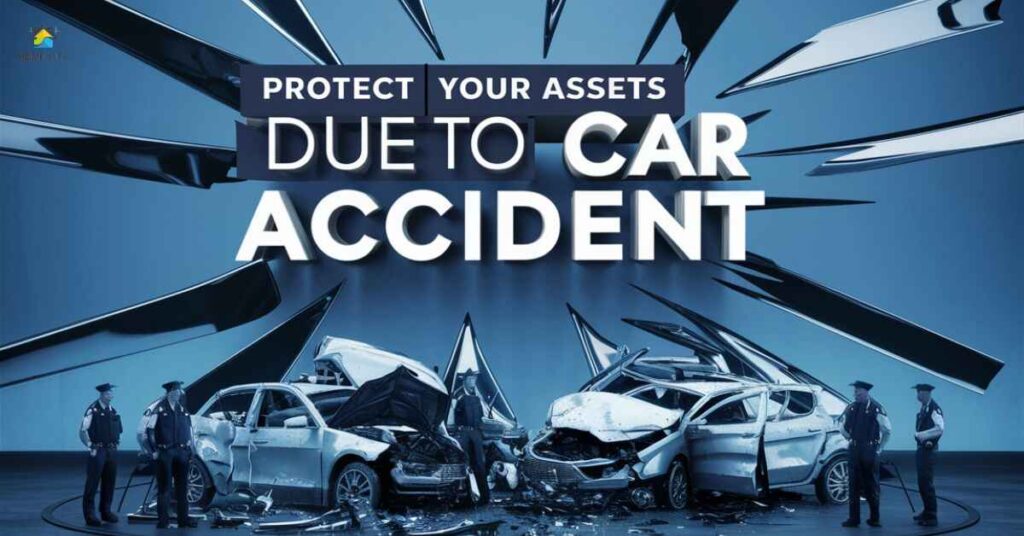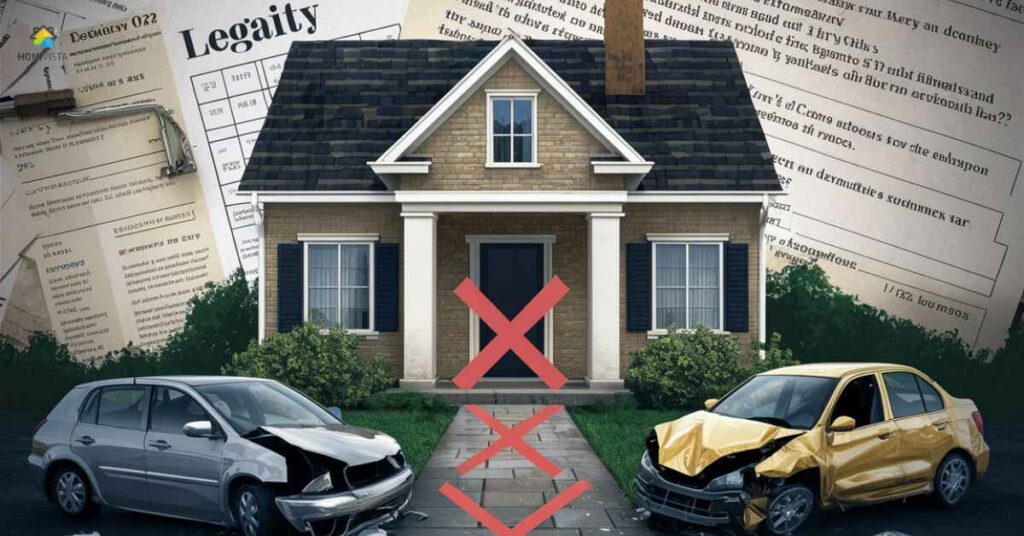Being at fault in a car accident can lead to losing your house due to financial liabilities. When you cause an accident, you’re responsible for damages like medical bills and property repairs. Insufficient insurance coverage may leave you personally liable for costs beyond your policy limits.
Legal action from the other party can result in court judgments, potentially leading to liens on your property. To avoid such severe consequences, it’s crucial to have adequate insurance coverage and drive responsibly.
Overview of car accident lawsuits in the United States
- Car accident lawsuits in the US involve seeking compensation for damages.
- Damages can include medical bills, vehicle repairs and lost wages.
- Lawsuits may result from negligence, recklessness or intentional actions.
- Plaintiffs must prove the defendant’s fault and the extent of their damages.
- Insurance companies often handle settlements but lawsuits may proceed to court.
- Settlements or court judgments can cover medical expenses, property damage and pain and suffering.
- Legal representation is common for both plaintiffs and defendants in car accident lawsuits.
- Statutes of limitations apply, limiting the time to file a lawsuit after an accident.
What to do after an at-fault car accident

After an at-fault car accident, it’s crucial to take immediate and responsible steps:
Remain at the scene: Stay at the accident site to fulfill legal obligations and ensure safety.
Call 911: Report the accident to emergency services for medical assistance and legal documentation.
Check to see if anyone is injured: Prioritize assessing injuries and providing aid if necessary.
Gather information: Collect details like names, contact information, insurance and vehicle details from all involved parties.
Call your insurance company: Notify your insurance provider promptly to report the accident and start the claims process.
Call a car accident lawyer: Consider consulting a lawyer for legal guidance and representation throughout the process.
Read this blog: How Long Will It Be On House Arrest
How car accident lawsuits can lead to the loss of your home
It’s crucial to have adequate insurance coverage and drive responsibly. Seek legal advice if faced with a car accident lawsuit to mitigate the risk of losing your home. Car accident lawsuits can potentially lead to the loss of your home due to several factors:
Liability Exceeds Insurance Coverage: Being found liable for an accident may make you personally responsible for costs. This applies if the costs surpass your insurance coverage limits. This could include medical bills, property damage and other expenses.
Court Judgments and Liens: If the other party sues and wins, they may receive a court judgment. This judgment may hold you responsible for paying the awarded amount. This judgment could hold you responsible for paying the awarded amount. If you’re unable to pay this judgment, the court can place liens on your property, including your home.
Foreclosure: Liens on your home from a car accident lawsuit judgment can create challenges. Meeting financial obligations may become difficult as a result. You may find it difficult to satisfy these liens as a result. This could potentially lead to foreclosure proceedings initiated by creditors or lienholders.
Financial Strain: Foreclosure may not occur immediately despite a substantial lawsuit judgment. However, the financial strain can create difficulties in meeting mortgage payments. This situation could potentially jeopardize your home’s security in the long term.
Ways to protect your home from being lost in a car accident lawsuit

Protecting your home from potential loss in a car accident lawsuit involves proactive measures:
Adequate Insurance Coverage: Ensure your auto insurance has sufficient liability coverage for potential damages. This coverage should also include legal expenses from at-fault accidents. This coverage should adequately protect you in case of any liabilities arising from such incidents. Consider adding umbrella insurance for extra protection.
Asset Protection Strategies: Consult legal and financial experts for asset protection strategies like trusts. Consider homestead exemptions and property titling to shield your home from creditors. These measures can be crucial if facing a lawsuit judgment.
Drive Responsibly and Maintain Safety: Follow traffic laws and maintain a safe vehicle to prevent accidents. Safe driving reduces the risk of at-fault accidents and potential home loss.
Legal Guidance and Representation: When facing a car accident lawsuit, seek legal advice promptly. Understand your rights, defenses, and asset protection options during the legal process.
Regular Insurance Reviews: Regularly review insurance policies to ensure adequate coverage for assets. Consider increasing coverage limits to keep pace with inflation and rising property values.
Protection your Assets

Here are some ways to protect your assets:
Colorado’s Auto Insurance System
Colorado’s auto insurance system operates within a framework designed to protect both drivers and their financial interests. Here’s an overview of how it functions:
Mandatory Insurance: Colorado law mandates that all drivers carry minimum liability insurance coverage. The coverage includes $25,000 per person for bodily injury. It also covers $50,000 per accident for bodily injury and $15,000 per accident for property damage.
Uninsured/Underinsured Motorist Coverage: Insurance providers in Colorado are required to offer uninsured/underinsured motorist coverage (UM/UIM). The coverage protects you in accidents caused by uninsured drivers. It also covers accidents where the driver’s insurance is insufficient to cover your damages.
Comparative Fault System: Colorado follows a modified comparative fault system. If you’re partly at fault in an accident, your compensation may decrease. It’s based on the percentage of fault attributed to you. However, if you’re found to be 50% or more at fault, you may not be eligible for any compensation.
No-Fault Insurance: Colorado is not a no-fault state. In most cases, the at-fault driver’s insurance pays for damages in accidents. The responsibility falls on the insurer to cover the costs incurred.
Insurance Verification Program: Colorado has an insurance verification program called the Electronic Title and Registration (ETR) program. This program requires insurance companies to electronically verify insurance coverage when vehicles are registered or renewing registration.
Penalties for Driving Without Insurance: Driving without insurance in Colorado can lead to severe consequences. Penalties include fines, license suspension, and vehicle impoundment. Reinstating your license and registration typically requires providing proof of insurance and paying fees.
Umbrella Policies: An Additional Layer of Protection
Umbrella insurance policies offer an additional layer of protection beyond standard coverage limits. They provide extra liability coverage that kicks in when your primary insurance limits are exhausted. Umbrella insurance is crucial when claims surpass regular insurance limits. It safeguards assets and offers peace of mind against unexpected financial liabilities.
Personal Bankruptcy as a Last Resort
Insurance and asset protection strategies reduce risks but may not suffice in extreme financial crises. Bankruptcy becomes an option in such dire situations. It can provide relief by discharging certain debts and protecting specific assets from creditors. Bankruptcy is complex with lasting consequences. Before deciding, explore alternatives and seek professional advice.
Avoiding the Risk: Safe Driving and Adequate Coverage
Practicing safe driving habits is essential for asset protection. Safe driving minimizes accident risks and legal liabilities. Adequate insurance coverage provides financial protection in unforeseen events. Regularly reviewing and updating your insurance policies can help ensure that your coverage aligns with your asset protection needs.
Also read: How Long Is House Inspection Good For
Frequently asked questions
Can I lose my house due to an at fault car accident in California?
In California, if the damages exceed your insurance coverage, you may face liabilities. These could lead to lawsuits and court judgments. Consequently, liens may be placed on your property, risking your home.
Do I pay excess if not at fault?
If you’re not at fault in a car accident, the responsible party’s insurance covers expenses. This includes damages, and you generally don’t pay excess or deductibles in such cases. However, making claims through your own policy may entail paying your policy’s excess or deductible.
Do most accidents happen close to your house?
No, most accidents don’t occur close to your house. Statistically, accidents are more likely to happen during routine drives or commutes rather than near your residence.
At what speed do most accidents happen?
Accidents in the USA mostly happen at speeds below 40 miles per hour. Urban areas and intersections are frequent accident spots.
Why do car crashes happen close to home?
Car crashes near home are common due to familiarity causing complacency among drivers. Reduced attention and risk perception are typical outcomes in such situations. Familiarity with local roads can also result in overconfidence, contributing to lapses in caution and higher accident rates.
Conclusion
Losing your house due to an at-fault car accident is possible. This happens when damages surpass your insurance coverage, leading to legal actions like lawsuits and court judgments. In such cases, you may be responsible for remaining costs. If you can’t pay, creditors can place liens on your property, including your home. This can ultimately result in foreclosure if the debts remain unresolved.
Being proactive can reduce risks. Maintain adequate insurance, drive responsibly, and seek legal guidance. Ensure sufficient liability coverage and understand legal rights to avoid severe financial consequences after accidents.

Meet Harry, our seasoned home decor specialist with three years of hands-on experience. His passion lies in crafting inviting spaces that reflect your style. From cozy corners to vibrant living rooms. Harry’s keen eye for design ensures every detail enhances the overall aesthetic. Trust him to turn your home into a personalized haven, blending functionality with flair.







